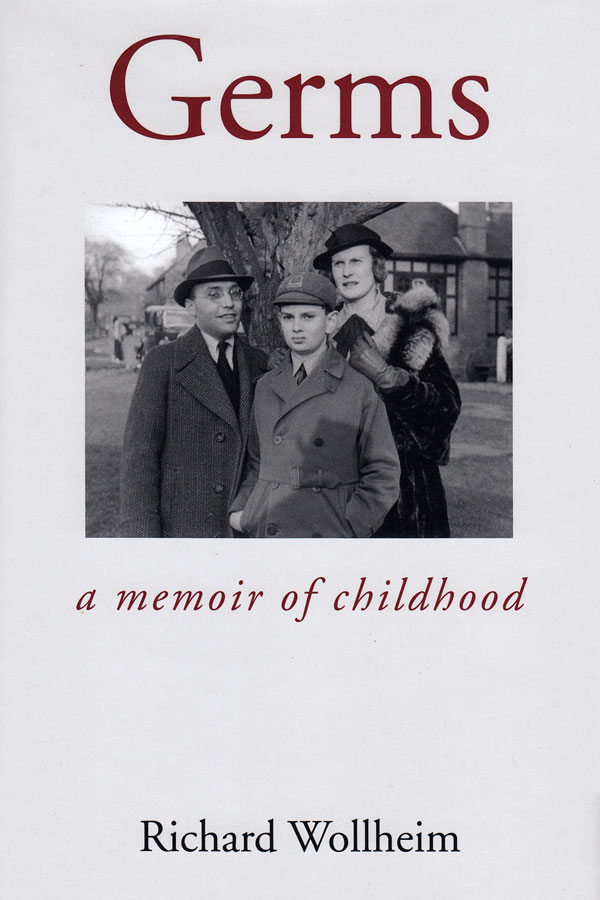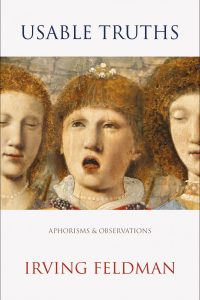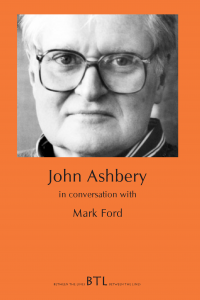Germs: A Memoir of Childhood
£10.95 / £13.99
It is early. The hall is dark. Light rims the front door.The panes of violet glass sparkle. The front door has been left open. Now I am standing outside in the sun. I can smell the flowers and the warmed air. I hear the bees as they sway above the lavender. The morning advances, a startled bird runs fast across the dew. Its breast quivers, in, out, and its song scratches on my ear. Lifting my eyes, I see that the garden, and everything in it, moves. The flowers move, and the lavender moves, and the tree above me is moving. I am standing in the sun, my body is tipped forward, and I am walking. Walking I shall trip, and, if I trip, trip without a helping hand, I shall fall. I look above me, and I feel behind me, searching for the hand that is always there. There is no hand …”
Thus begins a remarkable exploration of his childhood by the late Richard Wollheim, one of the English-speaking world’s most distinguished postwar thinkers, and the author of many acclaimed works of philosophy, including Painting as an Art and The Thread of Life.
“This is a book like no other. It is the work of a philosopher who was also an imaginative writer, and whose philosophy was sustained by a devotion to aesthetics and psychoanalysis. Richard Wollheim died in 2003, not long after the completion of the book, which he felt to be his ‘best piece of work’. An earlier book, A Family Romance, the portrait of a tormented manhood, shares some of its concerns. Germs, which traces a passage from childhood to youth, is a recovery of the past that is rich in sensation and in an exposure to the world.
It opens with the anxious somnambulism of a child’s exploring steps, with the ever-lengthening sentences of a paragraph in which an idea of development, and a sense of subsequent developments, are conveyed. Here is the first of many falls. Pierced by a thorn, the child is placed against the starched apron of a woman’s breast. Soon he is the boy who brushes against the ‘horse-like’ bodies of back-stage ballerinas: further brushes of the kind were to be long deferred.
His father is a fastidious impresario, a friend of Diaghilev’s and the incarnation of an Old Europe. His mother is a figure commandingly comic in her absurdities: a vexation and a fascination. Wollheim’s ‘Confessions’ tells the story of a wrestle for meaning with an environment wonderfully evoked, of an ordeal in the dark wood of experience which is both moving and funny, and which has the origins of an adult sexuality and of adult encounters with works of art. Hypersensitivity, and idiosyncrasy, are made a pleasure, and a version of the human condition. Once read, Germs will not be forgotten.”
– Karl Miller
Germs: A Memoir of Childhood
"One of the best books I read this year was the posthumously published Germs: A Memoir of Childhood, from a tiny outfit called the Waywiser Press and mentioned by half a dozen critics in their end-of-year selections." – D.J. Taylor, Guardian
"Wollheim regarded Germs as ‘the best piece of work’ he had ‘ever done’. The book … portrays the Thames Valley life of his affluent parents – the distant, dandified father he revered; the beautiful, mindless ‘Gaiety Girl’ mother he came to regret loathing – in dazzling detail. However, the dark heart of the book is the merciless, microscopic examination of the development of Wollheim’s psyche, not least of his realization that the price of love is fear. So long as Richard was alive, I found the sheer density of this book painful. Since his death, I am able to read it with delight. It must not be allowed to become a chef d’oeuvre inconnu."– John Richardson, Independent
"[A] frighteningly good memoir." – Andrew O’Hagan, London Review of Books
Book of the Year Nominations
Times Literary Supplement, December 3rd 2004
Germs was nominated by three of the contributors to the TLS‘s International Books of the Year feature. Only two other books received as many nominations and none received more. The nominations were from Frank Kermode, Roy Foster and Karl Miller and are reprinted below.
Frank Kermode
"Germs, Richard Wollheim’s posthumously published ‘memoir of childhood’ is a great book, strange and beautifully written, candid yet ornate, as if Rousseau were being rewritten by Proust, with interpolations by another author familiar with Beckett. Wollheim’s spoilt childhood – eccentric parents, important visitors (Diaghilev, Kurt Weill, Serge Lifar), grand houses and grand hotels – was lonely and sad and strange enough, but immensely more interesting than most. The child became an intelligent and sensitive observer, and what he recalls of those early days is here treated mostly with delicate irony. This is not a book to be admired for a season or a year, but to be counted among those masterpieces of which the fading memory continually demands return and refreshment."
Roy Foster
"The 1935 cover photograph of Richard Wollheim’s masterpiece of early autobiography, Germs: A Memoir of Childhood, gives a hint of what to expect: a serious twelve year old in school uniform, flanked by his elegant mother and Kurt Weill. Wollheim’s childhood was spent observing the glamorous company kept by his impresario father, trying to understand his distant and dissatisfied mother, and balancing the demands of love and fear; he explores it by methods which owe an equal debt to Proust and Freud, and it does much to explain the remarkable philosopher and aesthetic analyst that he became. The voice is inimitable: subtle, seductive, moving from deadpan hilarity to aching sadness."
Karl Miller
"The philosopher Richard Wollheim died last year, not knowing whether any publisher would want the memoir of his childhood, Germs, which he had just completed. Waywiser Press have now done what other presses felt unable to do. This is a moving and funny book, an extraordinary book, richly exposed to the Home Counties, in touch with the world created by Proust, and yet not in the least old-fashioned or archaic. He was the son of an impresario and dandy, and a maddening comic masterpiece of a mother. For some, the memoir may seem to conform to a pattern of compulsive behaviour which gets a lot of attention these days: the boy makes lists, which include one of royal mistresses, drawn up in ignorance of what royal mistresses did."
Evening Standard , November 29th 2004
D.J. Taylor
"Philosopher Richard Wollheim died last year; shortly after completing Germs, an acutely evocative memoir of his early life, spent in bourgeois Surrey but with an enticing Mittel European cast."
Reviews of Germs: A Memoir of Childhood
The Reader, #16, 2005
If ever there was a book condemned to be overlooked by the Common Reader, this posthumous memoir by the philosopher and psychoanalyst Richard Wollheim is it. That it exists at all is as an act of piety. That it has its defects as a memoir-it is over-verbal, often hysterically accurate, and often hyper-explanatory-is obvious. But I would hope that some readers will want to explore this dense, memory-clogged and enormously interesting book. The easiest way to describe it is as a sort of Bildungs-essay, an examination of growing up in two (or more) cultures. More accurate would be to call it an essay on the formation of a fine, perhaps overly-sensitive mind. The reason for reading it lies in the fact that Wollheim was an outstanding representative of a generation of Central European Jewish intellectuals transplanted into the Anglo-Saxon world, a member of a generation whose father was a friend of Diaghilev’s and who transformed himself into a typically self-tormenting yet generous member of the academic upper classes. From intense self-scrutiny much can be learned, and this memoir, which extends from childhood into Wollheim’s first acquaintances with art, has much to offer. It is the tone that may keep the unwary reader away. Not everyone today would write, ‘It was many years after those visits back-stage with my father that I first brushed against a woman’s body.’ What is riveting here is Wollheim’s sense-appetite, the way he perceives light, sound and shapes, colors and human beings, everything as seen through eyes and ears that must have been analytical at birth to have learned so much. – Keith Botsford
Globe and Mail (Canada)
I so admire Richard Wollheim’s memoir of his childhood, Germs, that it feels like a book written for me. I mean that in two ways. I mean both that I felt, while reading Germs, as if I were Richard Wollheim’s ideal reader but also, and more remarkably, as if he were speaking directly to me. I was engaged, in other words, as a reader (an admirer of Wollheim’s exquisite style) and as a human being, one who has experienced some of the terrors, sadness and beauty Wollheim captures … The description I’ve given of the various parts of Germs doesn’t convey two of the most attractive aspects of the book: Wollheim’s great, dry wit and his literary innovation. Germs is often very amusing, earnest in its absurdities (Wollheim strives heroically to explain his lifelong dread of newspapers, for instance) and, ultimately, filled with wonder. People, places, plants and animals are given their due, and Wollheim manages to be both caustic about and forgiving of his younger self. In fact, it may well be that the deepest goal of Germs, as he himself hints, is to convey why the things that are important to him are important, why the particular (the child) is still so vital to the adult he has become … His innovation lies in how he allows the sections of the book to play against each other. Though each section covers roughly the same time period, each complements and deepens the others. It’s rather like Nabokov’s Speak Memory, but Wollheim – passionately Freudian, which Nabokov pointedly was not – is a more surprising and open guide to his own childhood, especially its inner aspects. And as for "truth," it is, in Wollheim’s memoir, a kind of accumulation of bright details. He writes, on the last page of Germs: "Eventually, or such was the hope, I would, in saying one thing after another after another after another, each with a grain more of truth to it than its predecessor, come to spill the beans: I might ….. find myself, with one broad archaic gesture, scattering the germs." … It was, for me, very moving to read Wollheim’s recreation of the process. I can’t recommend it highly enough. – Andre Alexus
Los Angeles Times, August 14th 2005
"Whether put off by the title or baffled by its singular prose, big publishers turned this remarkable memoir down. Fortunately, a small press, Waywiser, saw the point. Germs came out in Britain last year, not long after Wollheim’s death in November 2003 at the age of 80. It dazzled critics. Many made it their book of the year … Wollheim is tireless at finding fresh aspects to an experience he is describing. Just when you think he has shown you every last facet of some childhood episode, up he comes with more. There may be no one who has teased out more fully the significance of seeing a father dress himself, or scrutinized with greater care the four distinct theories a sisterless boy dreamed up to explain the difference between the sexes. Years of psychoanalysis, Wollheim reminds us, sharpened this inward gaze … In its own highly crafted voice, [Germs] records a moral and sentimental education. Not only does Wollheim follow through on the idea that a past left unrecalled traps a person into mindless repetition, but he brings together, in a personal way, many of his philosophical preoccupations. From Hume, he took the idea that moral sentiments are a natural outgrowth of human circumstance; from Mill, the idea that each of us has our own ideals of happiness, which we should refine in the light of experience; and from Freud, the idea that those moral responses and ideals will twist or imprison us unless they have sprung from us in the right way: They must not be imposed from the outside or by imaginary figures of authority that we have, from fear or however, made our own. Other philosophers challenged him to put flesh on this skeleton, suspecting either that the parts did not fit or that, if they did, the result would be close to an unpalatable amoralism. One way to think of Germs is as Wollheim’s characteristically idiosyncratic reply to that challenge. – Edmund Fawcett
New York Review of Books, March 10th 2005
"Wollheim writes like no one else: the density of his prose, the detail, the intensity, the startling unexpectedness of what he says and the way he says it are unique and constantly amazing … The term ‘Proustian’ keeps cropping up in reviews and conversations about Germs, but there is something more scientific about Wollheim’s mode, as the title suggests …[I]n spite of the fact that he seemed a very urban kind of man, [Wollheim’s] descriptions of nature, especially of changing light, are magically perceptive and detailed, atmospheric without getting overblown … Guessing the initials in Germs [Wollheim refers to many of the people who appear in the memoir by their initials] has become a party game among London intellectuals. But that doesn’t stop them from admiring Wollheim’s memoir, which was chosen by several distinguished writers as their ‘book of the year.’ If reviews of his work seem too full of quotations, it is because Wollheim’s writing is indescribable – except possibly by him. It is as though he were both the analyst and the patient on the couch, both of them a remarkable and idiosyncratic prose." – Gabriele Annan
Irish Times, February 19th 2005
"[A] small masterpiece … Poets, it is said, are the same as other men and women, only more so: they may well perceive things more intensely than you or I but, more importantly, are also more noticing of what they see and feel, less inclined to shrug it off, more literally to remember it, tease it out, turn it round and make something precious of it. And of course they are not particularly noted for being happy. Though writing here in prose, Wollheim’s sensibility is certainly that of a poet. The intensity, delicacy and precision of the act of memory in Germs have provoked comparisons with Proust. Just comparisons perhaps, but this is a Proust who can also make you laugh out loud … In this fine memoir, Richard Wollheim has transmuted his childhood hurt and loneliness into an artful, precise, self-deprecating detachment. It is a very English sublimation." – Enda O’Doherty
Literary Review, February 2005
"Wollheim’s powers of description astound. Topographically or architecturally, no one has ever depicted London’s more prosperous suburbs with such exactitude. His prose is the verbal equivalent of Pre-Raphaelite painting, crowded with lovingly observed and richly coloured detail … [An] elaborately subtle and disturbing book … [B]ecause of the intensity with which a remarkable man has offered us a view of his inner self, I doubt whether anyone who has read it will forget it." – Diana Athill
Independent, December 27th 2004
" … Germs is not only elegantly written; it is a human document of considerable power and importance. In Wilhelm Meister, the first great Bildungsroman, Goethe sets his hero’s formal transition to adult maturity in a library which contains the secrets and confessions of men who enjoy worldly success. Only in the light of such admissions can the hero sanely assess himself. Wollheim avoids the two vices to which self-revelation is inclined: exhibitionism and apology. Germs is simply the sober, tactful admission by a highly cultivated and competent man of the reality of his inner world." – John Armstrong
Guardian, December 18th 2004
" … Germs [is a book] in which childhood experience, described with Proustian subtlety and thoroughness, remains invested with lasting power and singularity … In Wollheim’s hands the sentence – often half a page long, full of sinuous purpose and subtle qualification – takes on extraordinary interest as he searches for the precise colour and purport of a childhood memory. The effect is of intellectual exactness given expression as a work of art. For all the book’s rigour it is its poetry – the play of charged imagery, the sense of something impalpable that outlasts analysis – that one most remembers." – Alan Hollinghurst
To read the whole of Alan Hollinghurst’s review, please click link:Read Full Review
Times Literary Supplement, December 10th 2004
"[A] precise, intensely reflective and above all literary sensibility … lies at the heart of Germs … At first sight [it] might seem a variant on the Holroyd/Cobb/Lewis brand of English autobiography, which achieves its effects by way of of the meek self-effacement and the bumbling near-anonymity of the subject. In fact it is a very different kind of animal. Wollheim knows, or doesn’t mind admitting, his intelligence and his intellectual precocity, is confident, above all, that these things are worth writing about. Richard Wollheim died in 2003, before the manuscript was submitted for publication. One hopes that an early reader or two had assured him of its abiding quality." – D.J. Taylor
Daily Telegraph , November 27th 2004
"Germs evokes a prelapsarian world of infantile ecstasy and nightmare with uncomfortable honesty and almost hallucinogenic power." – Hilary Spurling
Spectator, October 23rd 2004
"Posthumous publication reveals [this memoir] to be a masterpiece – an unclassifiable work of startling originality in which the acutely sensual and confusedly cerebral experience of infancy, boyhood and adolescence is brilliantly recreated. Although it carries self-scrutiny to an extreme of scrupulous candour which I believe to be unique, the term ‘confessional’ – with its suggestion of apology and therapeutic exhibitionism – does not apply. There is little here of personal secrets being exposed to public view, but rather of the reader being intimately drawn into the heart of a deeply private life … [A]s a writer, Wollheim is entirely and gloriously his own man. Everything he tells us is totally unpredictable and, however surprising, always convincing … Germs is destined to be a classic." – Francis Wyndham
Observer, October 17th 2004
"[A] densely evocative book, achiev[ing] a degree of self-examination rarely found in the words people write about themselves … [The] exquisitely written investigation of an inner landscape … [T]here is a Proustian feel to the memoir, although W.G. Sebald is probably the nearest in style and unremitting excavation of every detail in this testament of an alienated youth." – Emma Tennant
To read the whole of Emma Tennant’s review, please click link:Read Full Review





